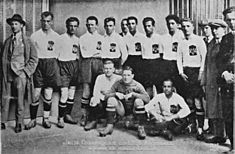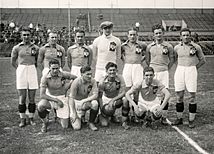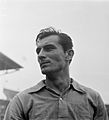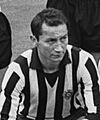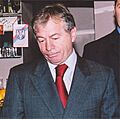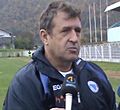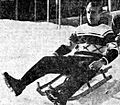Yugoslavia national football team facts for kids
| to 1920–1992 | ||||||||||||||||||||||||||||||||||||||||||||||||||
|---|---|---|---|---|---|---|---|---|---|---|---|---|---|---|---|---|---|---|---|---|---|---|---|---|---|---|---|---|---|---|---|---|---|---|---|---|---|---|---|---|---|---|---|---|---|---|---|---|---|---|
 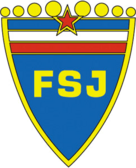 |
||||||||||||||||||||||||||||||||||||||||||||||||||
| Nickname(s) | Plavi (The Blues) Brazilians of Europe |
|||||||||||||||||||||||||||||||||||||||||||||||||
| Association | Football Association of Yugoslavia |
|||||||||||||||||||||||||||||||||||||||||||||||||
| Most caps | Dragan Džajić (85) | |||||||||||||||||||||||||||||||||||||||||||||||||
| Top scorer | Stjepan Bobek (38) | |||||||||||||||||||||||||||||||||||||||||||||||||
| Home stadium | Stadium Rajko Mitić, Belgrade | |||||||||||||||||||||||||||||||||||||||||||||||||
| FIFA code | YUG | |||||||||||||||||||||||||||||||||||||||||||||||||
|
||||||||||||||||||||||||||||||||||||||||||||||||||
| First international | ||||||||||||||||||||||||||||||||||||||||||||||||||
(Antwerp, Belgium; 28 August 1920) |
||||||||||||||||||||||||||||||||||||||||||||||||||
| Biggest win | ||||||||||||||||||||||||||||||||||||||||||||||||||
(Curitiba, Brazil; 14 June 1972) |
||||||||||||||||||||||||||||||||||||||||||||||||||
| Biggest defeat | ||||||||||||||||||||||||||||||||||||||||||||||||||
(Antwerp, Belgium; 28 August 1920) (Paris, France; 26 May 1924) (Prague, Czechoslovakia; 28 October 1925) |
||||||||||||||||||||||||||||||||||||||||||||||||||
| World Cup | ||||||||||||||||||||||||||||||||||||||||||||||||||
| Appearances | 8 (first in 1930) | |||||||||||||||||||||||||||||||||||||||||||||||||
| Best result | Fourth place (1930, 1962) | |||||||||||||||||||||||||||||||||||||||||||||||||
| European Championship | ||||||||||||||||||||||||||||||||||||||||||||||||||
| Appearances | 4 (first in 1960) | |||||||||||||||||||||||||||||||||||||||||||||||||
| Best result | ||||||||||||||||||||||||||||||||||||||||||||||||||
|
Medal record
|
||||||||||||||||||||||||||||||||||||||||||||||||||
The Yugoslavia national football team was a famous football team that represented the country of Yugoslavia in international matches. This team played from 1920 until 1992.
Over the years, Yugoslavia was known by different names. The football team represented these different forms of the country:
- Kingdom of Serbs, Croats and Slovenes (1918–1929)
- Kingdom of Yugoslavia (1929–1945)
- Democratic Federal Yugoslavia (1945)
- Federal People's Republic of Yugoslavia (1945–1963)
- Socialist Federal Republic of Yugoslavia (1963–1992)
The team was very successful in football competitions. They reached the semi-finals of the World Cup in 1930 and again in 1962. In 1992, due to conflicts in the region, the team was stopped from playing in international games. This was part of the United Nations sanctions.
Contents
Team History
The first national football team was formed in the Kingdom of Serbs, Croats and Slovenes. This was before World War II. The Football Federation was created in Zagreb in 1919. It was called Jugoslavenski nogometni savez. Soon after, it joined FIFA, the world football organization.
The team played its very first international game at the Summer Olympics in Antwerp in 1920. Their opponent was Czechoslovakia. The starting players for this historic match were: Dragutin Vrđuka, Vjekoslav Župančić, Jaroslav Šifer, Stanko Tavčar, Slavin Cindrić, Rudolf Rupec, Dragutin Vragović, Artur Dubravčić, Emil Perška, Ivan Granec, and Jovan Ružić. They lost the game 0–7, but they still made history!
The 1930 World Cup Journey
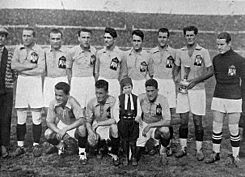
In 1929, the country's name changed to Yugoslavia. The football association also changed its name to Fudbalski savez Jugoslavije. Its main office moved from Zagreb to Belgrade.
The team took part in the first-ever 1930 FIFA World Cup in Uruguay. They finished in fourth place, which was a great achievement! In their first World Cup match, they had a famous 2–1 win against Brazil. The players for that game were: Milovan Jakšić, Branislav Sekulić, Aleksandar Tirnanić, Milutin Ivković, Ivica Bek, Momčilo Đokić, Blagoje Marjanović, Milorad Arsenijević, Đorđe Vujadinović, Dragoslav Mihajlović, and Ljubiša Stefanović.
This team was the youngest at the 1930 World Cup, with an average age of just under 22. The people in Uruguay liked them a lot and called them "Los Ichachos." Most of the players on this team were from Serbian football clubs. Some players from Croatian clubs, who usually played for the national team, did not join. This was because of the football association's office moving to Belgrade.
After World War II
World War II caused many problems for football in Yugoslavia. After the war, a new socialist government was formed. The football federation was rebuilt. In 1954, it became one of the founding members of UEFA, the European football governing body.
Olympic Silver Medals
Yugoslavia had great success at the Olympic Games.
- 1948 London Olympics: The team started their journey by beating Luxembourg 6–1. They then defeated Turkey and Great Britain, both by a score of 3–1. In the final match, they lost to Sweden, earning a silver medal.
- 1952 Helsinki Olympics: With many players from the 1948 team, Yugoslavia was very strong. They finished as runners-up again, losing to the famous "Golden Team" from Hungary. In one exciting match against the USSR, Yugoslavia was leading 5–1. But the USSR team made an amazing comeback, scoring four goals in the last 15 minutes to tie the game 5–5! Yugoslavia won the replay match easily.
Later Years and Nickname
In 1976, Yugoslavia hosted the European Championship in Belgrade and Zagreb. The national team played in eight World Cups and four Euro tournaments. They won the Olympic football gold medal in 1960. They also won three silver medals and one bronze medal at the Olympics.
The team was known for its skillful and attacking style of play. This led people to call them "the Brazilians of Europe."
Dragan Džajić played the most games for the national team, with 85 appearances between 1964 and 1979. The top goal scorer was Stjepan Bobek, who scored 38 goals from 1946 to 1956.
Team Breakup and Ban
As the Cold War ended, Yugoslavia faced many changes. Tensions between different parts of the country grew. In 1990, during a friendly match against the Netherlands in Zagreb, the crowd cheered against the Yugoslav team.
With the breakup of Yugoslavia, the team split into different national teams. The remaining team, representing the Federal Republic of Yugoslavia, was banned from playing in Euro 92. This decision was made on May 31, 1992, just 10 days before the tournament began. Yugoslavia had won their qualifying group, but they could not play due to UN sanctions. Denmark took their place and surprisingly went on to win the competition.
After the breakup, the Federal Republic of Yugoslavia included Montenegro and Serbia. In 1994, when the ban was lifted, the team continued to play as "Yugoslavia." Later, in 2003, the country and team were renamed Serbia and Montenegro.
Today, the Serbia national football team is considered the main successor to the Yugoslavia team by FIFA and UEFA.
Youth Teams
Yugoslavia also had successful youth football teams:
- The Under-21 team won the first UEFA U-21 Championship in 1978.
- The Under-20 team won the FIFA World Youth Championship 1987 in 1987.
Team Kits
|
1930
|
1950–1968
|
1974
|
1976
|
1982
|
1984
|
1990
|
1992
|
Player Records
Most Games Played
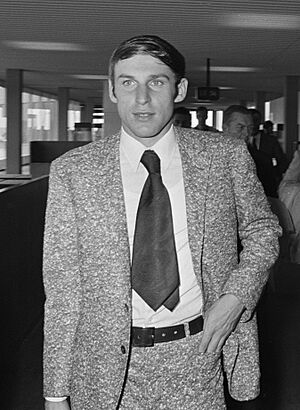
- Dragan Džajić: 85 games (1964–1979)
- Zlatko Vujović: 70 games (1979–1990)
- Branko Zebec: 65 games (1951–1961)
- Stjepan Bobek: 63 games (1946–1956)
- Faruk Hadžibegić: 61 games (1982–1992)
- Branko Stanković: 61 games (1946–1956)
- Ivica Horvat: 60 games (1946–1956)
- Vladimir Beara: 59 games (1950–1959)
- Rajko Mitić: 59 games (1946–1957)
- Bernard Vukas: 59 games (1948–1957)
Top Goal Scorers
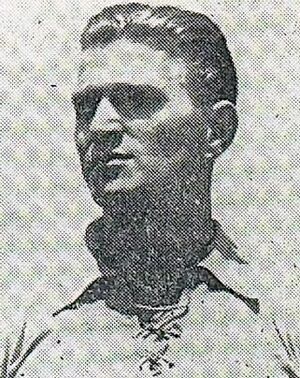
- Stjepan Bobek: 38 goals in 63 games (1946–1956)
- Milan Galić: 37 goals in 51 games (1959–1965)
- Blagoje Marjanović: 37 goals in 58 games (1926–1938)
- Rajko Mitić: 32 goals in 59 games (1946–1957)
- Dušan Bajević: 29 goals in 37 games (1970–1977)
- Todor Veselinović: 28 goals in 37 games (1953–1961)
- Borivoje Kostić: 26 goals in 33 games (1956–1964)
- Zlatko Vujović: 25 goals in 70 games (1970–1977)
- Dragan Džajić: 23 goals in 84 games (1964–1979)
- Bernard Vukas: 22 goals in 59 games (1948–1958)
Notable Players
Here are some of the most famous players who played for the Yugoslavia national football team:
Goalkeepers
-
Vladimir Beara played 59 matches from 1950 to 1959
Defenders
-
Milutin Ivković played for Yugoslavia from 1925 to 1934 and was captain in the 1930 FIFA World Cup
-
Branko Zebec played for Yugoslavia from 1951 to 1961 and was captain in the 1958 FIFA World Cup
-
Fahrudin Jusufi played for Yugoslavia from 1959 to 1967
-
Velibor Vasović played for Yugoslavia from 1961 to 1966
Midfielders
-
Aleksandar Tirnanić played in the 1930 FIFA World Cup and later managed the team
-
Bernard Vukas played 59 matches for the team from 1948 to 1957
-
Vujadin Boškov played for the team from 1951 to 1958
-
Dragoslav Šekularac played for the team from 1956 to 1966
-
Dragan Džajić is often seen as the best player in Yugoslavia's history
-
Ilija Petković, a fast right winger, played for the team from 1968 to 1974
-
Safet Sušić played for the team from 1977 to 1990
-
Dragan Stojković played from 1983 until Yugoslavia's breakup
-
Dejan Savićević played for the team from 1986 until Yugoslavia's breakup
Forwards
-
Stjepan Bobek is the top goal scorer in the team's history with 38 goals
-
Dražan Jerković was a top goal scorer at the 1962 FIFA World Cup
-
Milan Galić scored 37 goals in 51 matches between 1959 and 1965
-
Darko Pančev, a 1991 European Golden Shoe winner, played for the team from 1984 until Yugoslavia's breakup
Team Achievements
The Yugoslavia national football team won several important awards and competitions:
Major Competitions
- UEFA European Championship
- Runners-up (2): 1960, 1968
- Olympic Games
- Gold Medal (1): 1960
- Silver Medal (3): 1948, 1952, 1956
- Bronze Medal (1): 1984
Regional Competitions
- Balkan Cup
- Winners (2): 1934–35, 1935
- Runners-up (6): 1929–31, 1932, 1933, 1946, 1947, 1977–80
- Third place (1): 1931
- Mediterranean Games
- Gold medal (2): 1971, 1979
Friendly Competitions
- 1945 Yugoslav Football Tournament
- Champions (1): 1945
Related Teams
Here are some other football teams connected to Yugoslavia:
- List of Yugoslavia international footballers
- List of Yugoslavia national football team goalscorers
- Yugoslavia national under-21 football team
- Yugoslavia national under-20 football team
Teams from Countries that Used to be Yugoslavia
After Yugoslavia broke up, several new countries formed their own national football teams:
- Bosnia and Herzegovina national football team (joined UEFA and FIFA in the 1990s)
- Croatia national football team (joined UEFA and FIFA in the 1990s)
- Slovenia national football team (joined UEFA and FIFA in the 1990s)
- North Macedonia national football team (joined UEFA and FIFA in the 1990s)
- Serbia and Montenegro national football team (considered a successor of Yugoslavia by UEFA and FIFA)
- Later, this team split into:
- Montenegro national football team (joined UEFA and FIFA in 2006)
- Serbia national football team (considered a successor of Serbia and Montenegro since 2008)
- Later, this team split into:
- Kosovo national football team (joined UEFA and FIFA in 2016)
See also
 In Spanish: Selección de fútbol de Yugoslavia para niños
In Spanish: Selección de fútbol de Yugoslavia para niños


